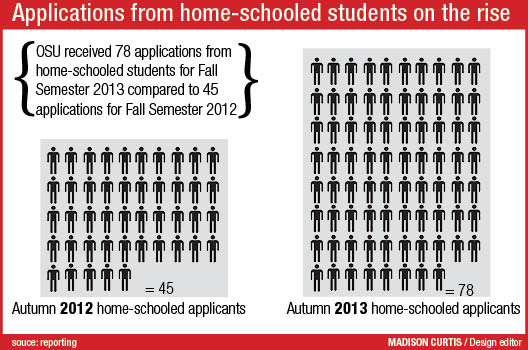Home-schooled students could soon become more common at Ohio State with applications on the rise.
In a statement from the Office of Enrollment Services, emailed to The Lantern by OSU spokeswoman Amy Murray, said the number of home-schooled student applications has risen significantly over the last several years.
“For Autumn 2013, we received 78 applications, which was an increase from the previous year of 45,” Murray said in an email.
There usually are only a “handful” of applications from home-schooled students, who follow the same admissions process as other applicants, Murray said.
According to a Fall Semester 2013 newsletter from OSU Undergraduate Admissions, OSU saw a nearly 25 percent increase in undergraduate applications overall for Fall Semester 2013 compared to the previous year. The increase in home-schooled student applications for the same span was proportionally higher, about a 73 percent increase.
Home schooling is on the rise in the United States, according to a study from the National Home Education Research Institute published in 2011. It estimated that while the number of school-aged children in the United States increased by 2.11 percent from 2007 to 2010, the home-schooled population during that time grew by about 7 percent.
As for academic performance, home-schooled students perform “just as well” as others in their class, Murray said. The Office of Enrollment Services, however, did not provide exact academic statistics.
Stephen Gavazzi, dean and director of OSU-Mansfield, said in an email that family involvement in general is “a huge predictor of academic success.”
“Home schooling obviously includes significant family involvement in the education process,” Gavazzi said.
Family involvement, however, is one of the few things that is present nearly across the board in home schooling. The rest varies from student to student.
Chris Lovekin, a fourth-year in plant health management, was home-schooled through high school in what he considered a semi-traditional manner.
“I was expected to take more initiative and be more self-motivated, but I would still have work assigned to me and I just had to have it done by some point,” Lovekin said.
Bri Simmons, a third-year in English education, was also home-schooled, but had a different experience.
“I did some of my school online, and I was privately tutored through most of it,” Simmons said.
She also took college courses through Columbus State Community College at the end of her high school career.
“I was already pretty used to how college works … so Ohio State really wasn’t an adjustment at all,” Simmons said.
Lovekin attended Cincinnati State Technical and Community College for his first two years of college, and said he felt better off for it.
“If I had not gone to a two-year institution, I think I would have been swamped with the expected workload,” Lovekin said.
Lovekin said he had seen others in his home schooling community struggle with the transition to college.
“The (home-schooled) people I have seen who try to go (directly) to a four-year institution have suffered setbacks, and it’s really stuff as simple as understanding … attendance,” Lovekin said. “So, it’s a training ground.
“I truly do believe you could come straight into a four-year institution, and if you were in the traditional home-schooler sect … with a set schedule every day, you could be successful.”
But Lovekin said there is a different common problem with that kind of home-schooled student.
“A lot of the kids in that situation are academically well-prepared … but socially they may not be as developed,” Lovekin said.
Simmons said she had joined an abundance of local programs she had access to in high school.
“I was super social all throughout high school. I did every possible club, team, extracurricular,” Simmons said. “I love people (and) large classroom settings.”
Simmons said now, even though she’s ahead, she isn’t ready to leave OSU.
“I’m only 19, but I could graduate next spring (in 2015) if I wanted to. I’m actually thinking about drawing out my … senior year so I can have more time,” Simmons said. “But I’m also super geeky, and I love school.”



